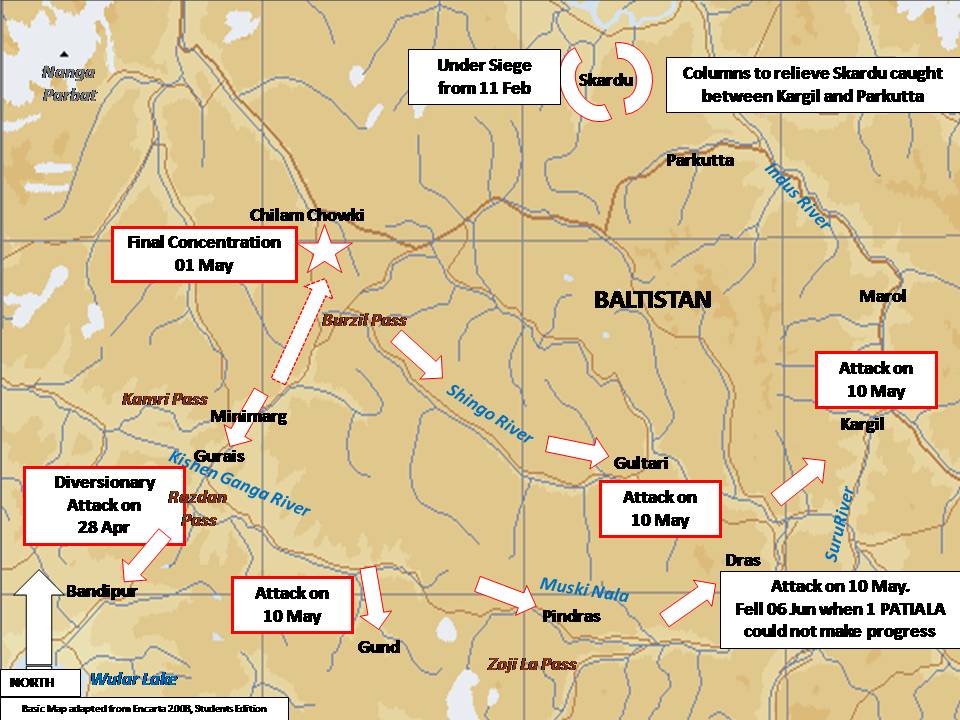For God's sake now stop clutching at straws as I mentioned earlier.
Please, deflecting!
I am
yet to see you prove a rebuttal which stands scrutiny to points put forth. But sure, thanks for exhibiting the point I was making - failure on our part to accept our shortcomings. Precisely being played out.
The plain fact is that there was NO Indian Army in J&K before 27 Oct 47 when 1 SIKH landed in Srinagar.
So, am I talking of period preceding it? I am speaking of time period from 27 Oct 1947 till fall of Skardu on 14 Aug 1948 (
1947 is followed by 1948, right?), with Princely State of J&K, acceding to and becoming a part of Dominion of India as legally formed under the Indian Independence Act of 1947. India became sovereign over the State of J&K thence on. J&K became India's responsibility.
So, what is your point here? And this is reply to what?
It were the J&K State Forces. It's beyond anyone's comprehension except yours why you can't or don't want to agree/understand this simple fact.
On the contrary, it is beyond any professional's comprehension how,
when a Legal Nation State incorporated the State of J&K under the relevant law which gave it the legality, the said legal state can absolve itself of any responsibility of the military forces at the disposal of the new state incorporated into its dominion.
Other than you, no one, not in Indian Army, not in GoI, abdicates responsibility over State Forces and TA units in action in the war subsequent to accession.
So, if the military authority which commanded these forces of the State of J&K which was no more a sovereign state, was a military authority of Dominion of India, which rule keeps them out of the ambit?
So please, get your facts correct. It is akin to Pakistanis claiming that India only captured a handful of Pakistani PoWs in Bangladesh War with remaining being
Razakars not part of Pakistani Forces.

And Lol! Your argument is funny. Why did Thapa retain his commission in the J&K State Forces? Because a Short Service commission in the Indian Army was temporary. Short Service Commissions are not permanent Commissions.
LOL back at you. When did the Constituent Assembly dissolve which gave the J&K Constitution, specifically removing the "Head of State" and replacing it with 'Sadr-I-Riyasat', as also declaring 'The State of Jammu and Kashmir is and shall be an integral part of the Union of India' come into being?
LOL, LOL & LOL.
Short Service Commission was temporary? Obviously, it still is. But do you give short service commission to non-citizens? Am curious.
Last I remember, a Gazette Notification was a legal declaration by the Government. No? It's not?
And if an officer is appointed to any armed forces of the nation through such a notification, it is the legal document of legitimacy to the individual of being an officer of the forces of India.
So, the government is a fool that they issued such a certification to State Forces? Were State forces foreign forces upon signing of Instrument of Accession? Or were they forces of State of J&K which were immediately & legally forces of India?
Now I am amused at your logic here.
I reiterate for your understanding. J&K State Forces were NOT the Indian Army. So attributing a defeat or loss of/at Skardu to the Indian Army is patently false. Period. Now, move on.
End of discussion.
So, State Forces were not under command of Indian Army in the period of 27 Oct 1947 to 14 Aug 1948 (the day Skardu fell)? And these were stateless forces as J&K was an Indian state wef 27 Oct 1947 as far as we all know, yet you claim these were state forces.
I am confused. So basically we had stateless army fighting for us? Is that what you are trying to say?
Again defeat. Strange you are, trying to make a narrative on my behalf patently false, deflecting from matter, and failing to rebut.
Let me list out Questions for you:
1. Was J&K State of India, legally, on 27 Oct 1947? Is 1947 followed by 1948 or not? (Since you keep harping on Indian forces only coming in on 27 Oct 1947 and not before, and I am still trying to understand what rationale does that hold)
2. Were all State Forces of J&K fighting against Pakistani invaders, automatically also forces of India on 27 Oct 1947? Or were they not automatically Indian?
3. If they were not automatically Indian Forces, were they 'stateless forces'?
4. Were these forces under operational command of Indian Army in a territory which was legally Indian territory?
5. Can you absolve military leadership of responsibility of forces operating at their command?
6. Was failure to establish an air bridge, akin to that established in defence of Srinagar, with an existing airfield at Skardu, with absence of PAF and employment of might of IAF in J&K ops, a military failure or not?
7. Did Gilgit fall to Pakistani forces (see, even their tribals are called their forces) in Nov 1947 (which comes after Oct 1947 before you post that 1 SIKH sentence again) or not? Was J&K the State of Dominion of India at the time or not?
8. Did Skardu fall in August 1948? Was J&K part of Dominion of India in August 1948 or was it a State of J&K which was not part of Dominion of India?
Try and answer.
Thanks



